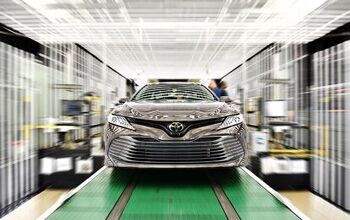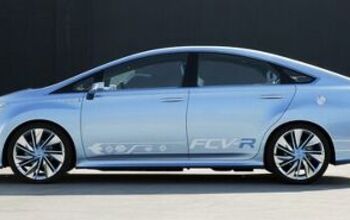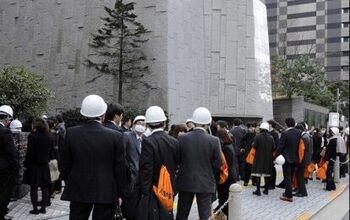Will Toyota Leave Japan?

For a while, TTAC has been tracking a strange story: Instead of exporting cars, Japanese carmakers (or should we call them factorymakers?) increasingly resort to exporting car factories. The higher and higher yen makes exports prohibitively expensive. On the other hand, a higher and higher yen buys more and more production capacity abroad. From Nissan to Mitsubishi, there is a chorus that sings the song that suddenly, people in low wage countries can make high quality cars. Now nobody would assume that Japanese carmakers plan a wholesale desertion of the land of Nippon, right? Wrong.
Today, we find an odd statement in The Nikkei [sub]: Toyota denies that they will leave Japan. At least not now …
According to Japan’s premium business wire, “Toyota Motor Corp is not considering hastily shifting production overseas despite the yen’s strengthening against the dollar, President Akio Toyoda said Monday.” Hmm. Did anyone suspect he would? Apparently, yes.
“We will not readily shift production outside of Japan, except in the most unusual circumstances,” said Akio Toyoda, probably in the direction of the Japanese government.
The most unusual circumstances might already be here. “Theoretically speaking, Toyota cannot afford to compete with its rivals,” Toyoda says.
They can easily compete if they shift production to low cost, soft currency countries, such as Thailand, or straight to the end user markets, such as the USA and Europe. In the latter case, the problem of how the foreign currency looks when converted into Japanese Yen remains. For that problem, there is another solution, which nobody dares to utter: Shift the headquarters abroad. A few years ago, large German companies made noises about moving their HQ into lower tax countries. Opel (make that GM Europe) actually moved to Switzerland. The German government got the message.
The Japanese government (with which the carmakers are a bit at odds) is probably thinking about what to make of Toyoda’s not so subtle hint.
PS: Did I mention that anyone who babbles about a soft Yen should have his head examined? Just in case I didn’t, I mention it again. Long term hospitalization is advised.

Bertel Schmitt comes back to journalism after taking a 35 year break in advertising and marketing. He ran and owned advertising agencies in Duesseldorf, Germany, and New York City. Volkswagen A.G. was Bertel's most important corporate account. Schmitt's advertising and marketing career touched many corners of the industry with a special focus on automotive products and services. Since 2004, he lives in Japan and China with his wife <a href="http://www.tomokoandbertel.com"> Tomoko </a>. Bertel Schmitt is a founding board member of the <a href="http://www.offshoresuperseries.com"> Offshore Super Series </a>, an American offshore powerboat racing organization. He is co-owner of the racing team Typhoon.
More by Bertel Schmitt
Latest Car Reviews
Read moreLatest Product Reviews
Read moreRecent Comments
- Keith Most of the stanced VAGS with roof racks are nuisance drivers in my area. Very likely this one's been driven hard. And that silly roof rack is extra $'s, likely at full retail lol. Reminds me of the guys back in the late 20th century would put in their ads that the installed aftermarket stereo would be a negotiated extra. Were they going to go find and reinstall that old Delco if you didn't want the Kraco/Jenson set up they hacked in?
- MaintenanceCosts Poorly packaged, oddly proportioned small CUV with an unrefined hybrid powertrain and a luxury-market price? Who wouldn't want it?
- MaintenanceCosts Who knows whether it rides or handles acceptably or whether it chews up a set of tires in 5000 miles, but we definitely know it has a "mature stance."Sounds like JUST the kind of previous owner you'd want…
- 28-Cars-Later Nissan will be very fortunate to not be in the Japanese equivalent of Chapter 11 reorganization over the next 36 months, "getting rolling" is a luxury (also, I see what you did there).
- MaintenanceCosts RAM! RAM! RAM! ...... the child in the crosswalk that you can't see over the hood of this factory-lifted beast.


































Comments
Join the conversation
Japan is ahead of the curve compared to it's Asian neighbors in preparing for the economic shifts in play. The rest of Asia is locked into the same old thinking of a continuing strong Dollar + a strong Euro while having their own currency weak for their export market. Over the next few years they will either have stronger currencies in Asia or we will have a currency/trade war. China is at center stage. Japan understands that trying to predict currency valuations and react is an act in futility. The time needed to make shifts take too long. In theory currency valuations should correct trade imbalances over time. So as these happen it can also quickly go the other way. So the Japanese thinking may be why not just establish operations in each key market as a "point of manufactiuring". Then change the percentage of production from either Japan or the alternative "point of manufacturing" depending on the currency valuations & commodities at the time. Now they have a 1-2 month reaction time instead of 1-2 years.
I'm more concerned about the fate of the smaller Japanese automakers. Toyota will be fine. Yes, they will move more production to other countries, but their heart is Japanese.